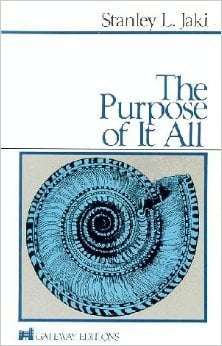Despite Stanley L. Jaki’s distinguished and protean career, his books are not often reviewed in our most prominent cultural journals. The best response of the progressive scientistic establishment seems to be to ignore his work as much as possible, in the hope that such neglect will doom it. Books by feminist witches. New Age gurus, “gay” liberators, and unrepentant Harvard Marxists can all be reviewed in the pages of the Washington Post Book World and the New York Times Book Review, but not the writings of a learned philosopher and historian of science.
Jaki’s new book, The Purpose of It All, is the text of the eight lectures he delivered under the auspices of the Farmington Institute for Christian Studies while he was visiting fellow of Corpus Christi College, Oxford, in 1989-1990. For at least twenty-five years, since the publication of The Relevance of Physics in 1966, Jaki’s books have been warmly welcomed by physicists, including the Swiss W. Heitler and the Oxfordian Peter Hodgson, but they are of great value also to students of the humanities, to literary critics, writers, theologians, and the general literate public if it wishes really to understand the modern intellectual situation, its prospects and problems. The Purpose of It All is a recapitulation, extension, and development of Jaki’s thought, but especially of his profound and judicious essays on the clash between religion, ethics, and science in the Victorian and post-Victorian periods (“A Hundred Years of Two Cultures” and “Knowledge in an Age of Science,” reprinted in Chance or Reality and Other Essays, 1986).
Part of Jaki’s task is to take the reader on a tour d’horizon of the various world views that have been constructed over the last century. This might be read as a working out in detail of Chesterton’s adage that the difficulty that ensues when people cease to believe in Cod is not that they believe in nothing, but that they believe in anything. This is not to suggest that Jaki believes that the belief in God is provable by the methods of science. For him, as for all the great figures in our central tradition of rational theism, science is simply incompetent to deal with nonphysical realities on which, nevertheless, its very existence and methods are dependent: truth, validity, noncontradiction, purpose, obligation. As most wise and thoughtful persons in the West since Socrates have realized, “objectivity” does not equal “objectness,” and science is not the equivalent of reason but a subset of it.
In the noncommunist West, as Jaki shows, scientistic ideas encouraged the ruthless immoralism of individuals (social-Darwinist capitalism) and of groups (nationalist, imperialist, fascist, and Nazi ideologies of competitive strife) and of modern painting and literature, dominated as they are to an unprecedented degree by what one writer calls “the bondage of purposeless freedom.” As Jaki knows, this was the outcome of 19th-century German, French, and English atheism, agnosticism, and aestheticism. Yet Jaki does not simply deplore these developments. Instead, he shows how they grew out of misunderstandings, falsifications, and misuses of the scientific method and of its results and possibilities. Darwin is a key figure here—as he was for Jacques Barzun and Gertrude Himmelfarb—along with his legion of voluble and reductionist followers, few of whom have had the insight and courage that permitted Thomas Henry Huxley in the last years of his life to change his opinions so dramatically regarding the alleged omnicompetence of Darwinian natural selection. From Darwin himself to Jacques Monod and Richard Dawkins, Darwinism has had, in Jaki’s words, “man’s sense of purpose as the chief and immediate target.” Jaki’s nuanced discussion of Darwin and his legacy avoids the errors of so many scientifically ignorant critics. “On the one hand,” he told a New York Times interviewer in 1987, “I completely reject the use of the first chapter of Genesis as a scientific text about the origin of the universe, and to be taught as such in schools. At the same time, I also reject, and just as emphatically, the teaching of a counter-creationism in schools in which matter is eternal and the human mind is but a chance product of so-called evolutionary forces.”
Jaki eloquently and combatively articulates the tradition of classical and Judeo-Christian learning, piety, and humanism that has provided the intellectual and moral center of Western civilization—with all its hypocrisies, sins, follies, and backslidings—since New Testament times. Science is one of the greatest achievements of this tradition, one of the most glorious and purposeful products and uses of the rational mind, but its very greatness can and has led to its idolization and lethal misuse. As a-good Thomist, Jaki knows and communicates the insight that “second things suffer by being put first,” that science is a good servant but a bad master. No lesson is more valuable in our confused and chaotic time, and no one teaches it more judiciously or in more illuminating and specific detail than Stanley Jaki.
[The Purpose of It All, by Stanley L. Jaki (Washington: Regnery Gateway) 294 pp., $10.95]

Leave a Reply